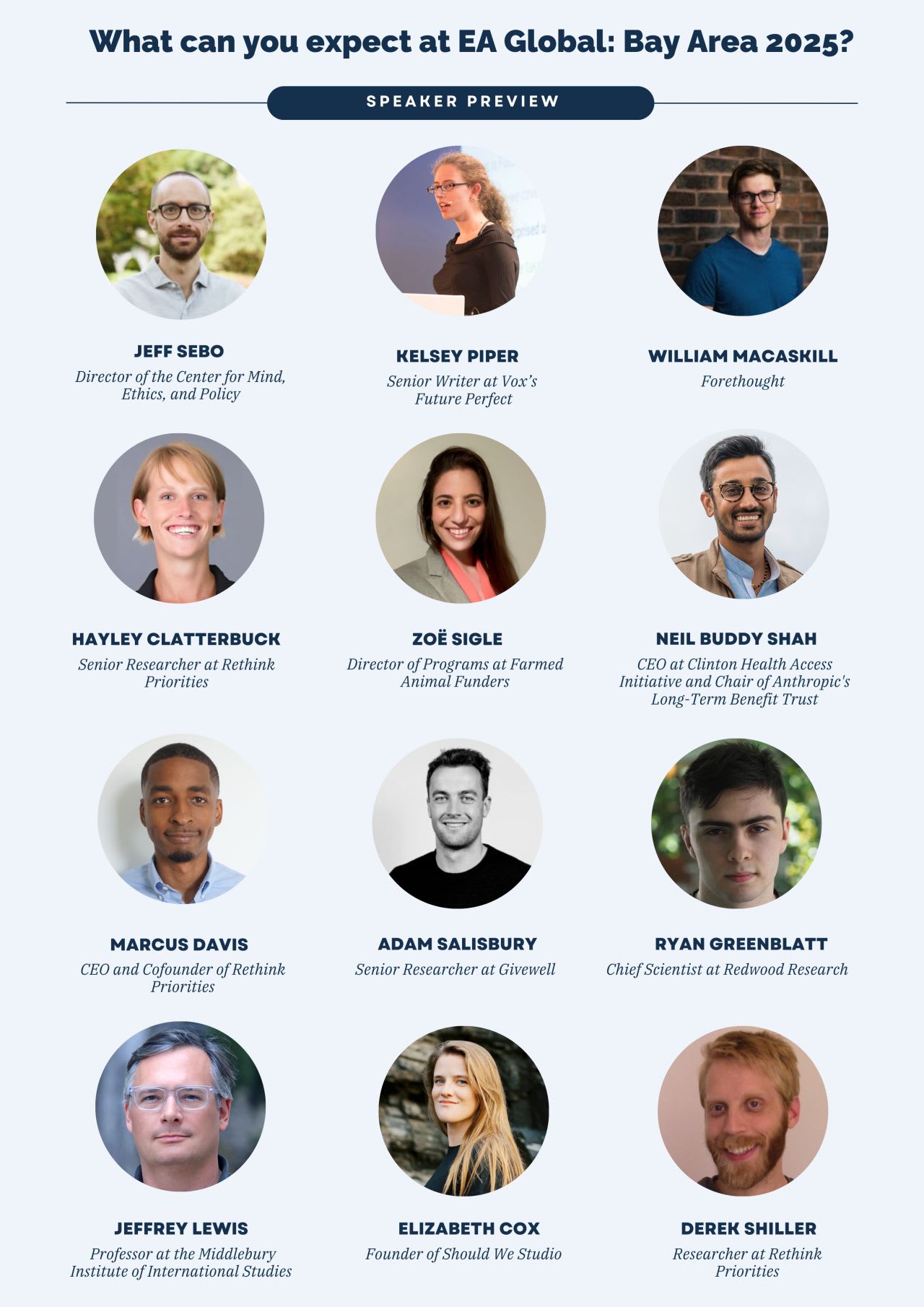TL;DR:
Apply now- Applications for EAG Bay Area close this Sunday, Feb 9th!
- It’s already on track to be one of our biggest ever US EAGs, but we’d like to make it even bigger.
- Due to our current catering and venue costs, it’s relatively cheap at the moment to add extra attendees. So please don’t avoid applying because you’re worried about cost or taking someone else’s space!
- If you’ve been accepted already, please register as soon as possible to confirm your place and get access to Swapcard.
Updates and Reminders
We wanted to share a few quick updates and reminders about EAG: Bay Area, happening Feb. 21–23. We’d love for you to apply (deadline Feb. 9th), and encourage friends and colleagues (especially ones in/near the Bay Area) to apply, perhaps by sharing this post!
- This year’s EA Global: Bay Area will not be focused only on global catastrophic risks (as it was last year) and will be the same as other EAGs. We're dropping the GCR-focus because CEA is aiming to focus on principles-first community building, and because a large majority of attendees last year said they would have attended a non-GCR focused event anyway.
- We welcome applications regardless of the cause you’re focused on, as long as it’s informed by EA principles.
- We recently wrote a post discussing the admissions bar for EA Global and received feedback that the approval rate to EAG is higher than many readers suspected (~84% acceptance rate). The post also discusses why we have an admissions process, what we look for in applications, and why you should apply.
- As of 2024, we’ve decided to weigh EA context less heavily for those with significant work experience, to encourage engagement from more mid- to late-career professionals.
- Given our current contracts with our catering provider and venue, it is relatively cheap for us to accept additional attendees. Please don’t avoid applying out of concern you might be taking up someone else’s spot.
Why you should apply to EA Global
We suspect there are many people who clearly meet the admissions bar who are not applying
While the number of applications to EA Global 2024 are more than double five years earlier, they have declined each of the last two years. There are likely several contributing factors here, such as a reduction in travel support availability, general trends in community building, and limited marketing efforts over the past couple of years. (We're excited though that we're on track to reverse this trend and increase attendance significantly in 2025!)
We also suspect that declining numbers could, in some part, be influenced by a widespread belief that the admissions bar for EA Global is high. However, this most recent year we approved around 84% of applications. Currently, we suspect there are many people who will clearly meet the bar who are not applying.
In general, we are excited to receive more applications in 2025 and beyond; one of our core aims moving forward is to increase EAG attendance while maintaining attendee satisfaction and curation.
Events are expensive; we don’t want this to deter applications
EA Globals cost a significant amount of money to run. Some anecdotal feedback suggests that people in our core target audience are not applying for fear that the value they expect to gain is not worth the cost to our team.
While we sincerely appreciate support from attendees and thoughtfulness towards the cost of our events, we believe that subsidising EA Global attendance is a good use of EA resources, based on analyses of our feedback surveys and actions taken by attendees as a result of the event. Additionally, the marginal costs of extra attendees can vary due to a range of considerations, including various fixed costs that come with events. In the case of EAG: Bay Area, because of minimum spend requirements in our catering contract, we can absorb more attendees without increasing our food costs by much. Our team has the best context on relevant cost considerations—getting admitted to an EAG means that we are willing to cover your attendance. Feel free to defer to our judgement.
If you’re considering applying to EA Global, we encourage you to apply. If you would like support from our team in deciding whether EA Global is right for you, please reach out to hello@eaglobal.org or comment below.
How others have gotten value out of EA Global
We believe EA Global has a strong track record of providing value to attendees:
- Many EA orgs come to EAGs actively looking to hire for roles — you’ll be able to chat directly with them at our Organization Fair, and send 1-1 meeting requests to relevant employees.
- Many senior professionals in a variety of EA cause areas attend EAG with the main aim of providing advice and mentorship to newer community members. EAG is a great place to speak to people who work in career paths you're considering and get advice.
- People working at the cutting edge of many cause areas will be attending and able to share their insights through talks, workshops and 1-1s.
Below, you can see some highlights from EAG Boston:
And we're excited to preview some of the great speakers we'll be hosting:

Let us know if you have any questions in the comments, or by emailing hello@eaglobal.org.




Just wanted to say, for anyone on the fence about attending these conferences, DO IT!
I just returned from it, and am leaving lit up and inspired about all the people and organizations working so hard to change the world. There's a lot of negativity out there, but also - so much great working being done.
If you're considering diving in deeper into EA, please do it (and tell everyone you know!).